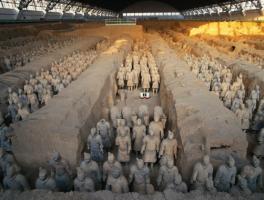Friendship Blossoms Between Hui and Han in Ningxia's Farmlands
"The first time I came to the countryside in northern Yinchuan, Ningxia, I felt the confidence and power of the people here—men or women, the Hui people or the Han people—from their simple and dark faces," I said to an elderly man.
"Yeah, they are like what you saw!" the senior smiled and answered.
At the time, I was not quite sure what he meant. But as I visited the region more and more, I came to understand that the "confidence" and "power" I saw in the locals were partly from their anticipation of and excitement about the plowing season in spring and partly from the natural, harmonious common practices, social conduct and overall atmosphere of the coexistence between the Hui and the Han people.
Every April and May is an especially busy time in most villages in Yinchuan, Ningxia. This is a time crucial for rice farming. During this time, I visited a Han family surnamed Luo in Tongfu Country, Yaofu Township, Pingluo County.
Villagers told me that Tongfu Country is a typical country where the Hui and the Han people live together as neighbors. Take the village of Mr. Luo for example, it has four production teams, standing in a row facing north to south, of which three are inhabited by Hui people. The production team which Mr. Luo and the other Han farmer households belong to, stands between the above three production teams. Mr. Luo smiled and said, "It's been more than fifty years and I get up with the mosque taratantara, and finish my work and go home for lunch hearing the taratantara at noon almost every day."
The day we visited Mr. Luo, we heard the sound of laughter from the living room the moment we reached the gate. Once we were in the room, we found out that the village head and the head of the production team happened to be there, too, discussing irrigation for the rice farms in the plowing season in spring. In the kitchen, Mrs. Luo said hello to us, and then asked her two Hui neighbors how to make deep-fried pancakes and fried dough twists. The son of Mr. Luo also told us that he spent almost his entire childhood with the Hui children and that they skated together in winter and swam together in summer. Back in school, half of his classmates were of the Hui nationality, and the rest were of the Han nationality. Everyone was used to coexisting together. If a close friend of the Hui nationality transferred to a new school, he and the other Han classmates would be very sad and upset.
It was time for lunch before we realized it. Mrs. Luo presented a good lunch for us—flash-fried lamb, fried beef, boiled carp, and several vegetable dishes, healthy well-balanced and healthy meal. During lunch, Mr. Luo told us that his wife learned "cooking mostly from our neighbors of the Hui nationality. Hui and Han people live very harmoniously here. We borrow farming tools from one another, and work together. Whenever some family has trouble, all the others would pitch in and help. We respect each other's religious beliefs and customs. At every Corban Festival or Spring Festival, we would invite them home."
Then Mr. Luo became excited. "The Hui and the Han people were not on speaking terms, but now they are, probably because of the harmony between them, the good environment and atmosphere and mutual respect. We become closer and closer. It has become quite common that during busy farming seasons, we help each other." In addition, there is intermarriage. Two girls of the Han nationality in the production team to which Mr. Luo belongs have married men of the Hui nationality.














